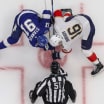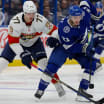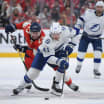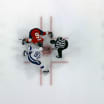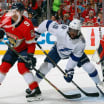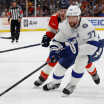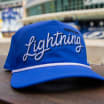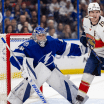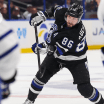Tampa Bay's start to the Eastern Conference Final in Game 1 versus the Washington Capitals Friday night went about as poorly as one could expect.
"Everything we did tonight, we've got to do the exact opposite (in Game 2) on Sunday," Lightning defenseman Dan Girardi summed up succinctly.
Washington dominated the Lightning in the opening game of the Conference Final round, jumping out to a 4-0 lead and never wavering in the third period despite two goals from the Bolts that made the 4-2 final score look closer than it actually was.
Burns: 3 Things we learned from a Game 1 loss to Washington
Lightning beat writer Bryan Burns recaps the Bolts 4-2 loss to Washington
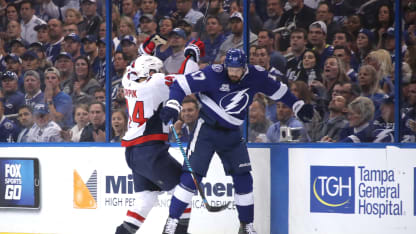
© Bruce Bennett
"They were playing an Eastern Conference Final, and we were playing game 38," Lightning head coach Jon Cooper said matter-of-factly.
Tampa Bay has its work cut out to rebound from a dismal performance in Game 1. Fortunately they only have 48 hours to stew over Friday night's loss with a practice session mixed in Saturday to try to figure out what went wrong against Washington.
"The good thing is we've got another game," Girardi said. "We've got one more day and another game at home, just have to have a lot better start, be sharp off the beginning and play our game."
Not much of anything went right for the Bolts in Game 1. Here were Tampa Bay's three biggest failures.
1. BOLTS COME OUT FLAT AGAIN
In the buildup to Game 1, the Lightning referenced the opening game of the Second Round series against Boston as a wake-up call for the team. In that 6-2 loss, the Lightning looked sluggish coming off a six-day layoff between games and failed to match the Bruins' intensity level.
They wouldn't make the same mistake twice, they said.
Talking about it and doing it, however, didn't go hand in hand.
The Lightning played tentative in the first period and didn't have that same jump they displayed over the final games of the Second Round series. Washington, meanwhile, still feeling good about itself from dispatching its playoff nemesis Pittsburgh four nights earlier, was ready to go right from the opening puck drop. It seemed as if the Capitals had more clean breakouts out of their zone in the first period than Boston did in Games 3 through 5 combined. The forecheck that harassed the Bruins into numerous turnovers was nowhere to be found early for the Lightning. Anytime the Bolts had a glimmer of a scoring chance, the Caps got in the way to break it up.
By the end of the first period, the Lightning had just two shots on goal, a franchise low for shots on goal in a period in the playoffs.
"That's not good enough," Alex Killorn said from the Lightning locker room following the loss. "We're a team that thrives on second chance opportunities and building off shots on net. When you have two shots, it's deflating."
While the Lightning only had two shots in the first period, the Caps already had two goals.
"You can tell right away, you look up at the clock, we had a lot of zone time and we didn't have a shot on goal," Cooper said. "That kind of summed up the way our night was about to go."
Against Boston, the Lightning could point to their long layoff and the Bruins' do-or-die Game 7 three nights earlier versus Toronto as reasons why they might not have been ready from the start.
The same excuses don't hold water against the Capitals. Washington clinched just one day after the Lightning, so both teams had basically the same amount of time to prepare. Both teams were rested and talked about being focused for Game 1. In fact, a lot of pundits thought the Caps might experience a letdown after getting out of the Second Round for the first time since 1998.
Washington was able to carry its momentum over from the series win against Pittsburgh.
The Lightning have to start from scratch each round it seems.
"it's twice in a row," Ryan Callahan said. "I don't think (the long layoff affected us), but you know for whatever reason against Boston and now against Washington, it happens. That's on us. We have to be better prepared and be ready to go. Again, I felt like we were ready to go in the Boston game. I felt like we were ready to go here with the work we put in before both of those games, but for whatever reason we're not and we just have to put it behind us now. We've been in this situation before unfortunately. We don't want to be, but you don't have to look too far to draw back to how we responded against Boston and we have to do the same here."
2. LATE 1ST-PERIOD SEQUENCE SINKS LIGHTNING
Despite the poor start, the Lightning trailed just 1-0 late in the first period, Washington getting on the board on Michal Kempny's left point shot that Andrei Vasilevskiy couldn't pick up through the host of bodies in front of him.
With less than 30 seconds remaining in the period, the Bolts appeared to tie the game when Nikita Kucherov got free behind the Caps defense, and while being dragged down, was able to beat Brayden Holtby over the shoulder.
Unfortunately for the Lightning, they had too many men on the ice, and the goal was waved off immediately by the officials. Replay showed that the call was an easy one to make.
"We were six men by a mile, so I don't think anybody was too fired up about the goal," Stamkos said.
On the ensuing power-play face-off in the Lightning zone, T.J. Oshie won the draw back to Evgeny Kuznetsov in the right circle. Kuznetsov immediately fired to the high slot for Alex Ovechkin, who blistered a one-timer past Vasilevskiy.
In a little less than a minute of real time and mere seconds of time on the game clock, the Capitals turned a potential 1-1 tie into a 2-0 lead heading into the first intermission.
The Lightning never really recovered from that sequence of events.
"That gave us a real boost," Washington head coach Barry Trotz admitted. "That was a window for us, there was a window of opportunity for us, and we were able to do something with it. In playoffs, you might get only one or two a game. That was one of those windows that we were able to execute on and take advantage of."
3. ANOTHER OPPOSING POWER PLAY FIND SUCCESS
The solid play of the Tampa Bay penalty kill in the First Round series victory over New Jersey was wiped out partially by Boston's success on the power play in the Second Round. The Bruins converted on 5-of-12 power-play opportunities, but the Lightning were able to get the critical kill when they needed it, namely the kill with four minutes to go at the end of Game 5 to help clinch the series.
Any good feelings the Lightning still had about their penalty kill, however, were wiped away after Game 1 against Washington.
After Ovechkin scored the Capitals second goal just two seconds into the Caps first power play, Washington converted its second power play of the game as well, this one coming at 6:42 of the second period and effectively extinguishing any hopes the Lightning had of rallying.
The Caps finished 2-for-4 on the power play, their last two opportunities with the man-advantage coming up empty.
But at that point, the damage had been done.
So how do the Lightning get better on the penalty kill?
"It's pretty simple really, we've just got to stay out of the box," Girardi said. "There's going to be penalties in the game, but one or two you can maybe get away with. Obviously the one at the end of the first hurts. It's a bang-bang play. He's got one of the best shots in the league. Killer tries to block it. He shoots it by him. It's a great shot. The second one, I go to block it, he fans on it, everyone thinks it's going to be a hard shot and just kind of trickles to the net and they've got a tap in. Other than that, when we kept them under pressure and keep them moving the puck quick, we were a little better. That's something we've just got to keep working on."
The Bolts will have plenty to work on, penalty kill included, when they reconvene at the Ice Sports Forum on Saturday to dissect how to recover from a dismal start to the ECF.


